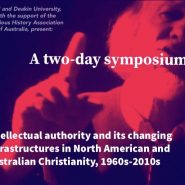CALL FOR PAPERS – A workshop hosted by ACU and Deakin University – July 29-30

CALL FOR PAPERS
A workshop hosted by ACU in partnership with Deakin University with support from the Religious History Association of Australia, July 29-30 AEST, ACU Brisbane and online
Intellectual authority and its changing infrastructures in Australian and North American Christianity, 1960s-2010s
Call for Papers: The seismic events of 2020—a global pandemic with differing levels of trust in public health authorities, the prominence of conspiracy theories, and fresh attention to the ongoing impact of systemic and individual racism—have once more made clear the significance of the way Christians relate to issues of knowledge, expertise and authority in the public sphere.
Yet the events of 2020 did not come from nowhere. This symposium aims to explore the longer historical crises that sit behind the present picture. It is 25 years since the publication of Mark Noll’s landmark Scandal of the Evangelical Mind (Eerdmans, 1994) which surveyed the historical roots of what Noll saw as the lamentable state of evangelical engagement and involvement with mainstream knowledge production enterprises in the US. More recently, Molly Worthen’s Apostles of Reason: The Crisis of Authority in American Evangelicalism (Oxford, 2014) provided a nuanced account of the many ways in which US evangelicals since the 1960s sought to respond to the “crisis” of epistemic authority in the US. She described how many US evangelicals had developed an alternative intellectual infrastructure of their own, generating a distinctly evangelical expert whose authority was recognized and deployed in an evangelical mediascape and educational network. This symposium seeks to widen and build on such US-focused work by including the Australian context, encompassing a scope broader than just evangelicalism.
By “infrastructures” of intellectual authority, the workshop aims to put into historical perspective the way Christians in Australia and North America have licensed and credentialed ideas and their purveyors as authoritative or not. This includes churches and their professions of adherence to the authority of scripture and ecclesial authority but goes beyond these dimensions to explore actually practiced historical mediations of intellectual authority over the previous 50 years at the interfaces of universities, Bible colleges, publishing and marketing houses, media ecologies and parachurch ministries and more. It also includes factors shaping orientations of trust or suspicion toward mainstream expertise and theological relations with secular disciplinary knowledge.
The workshop also considers these infrastructures in the light of the ongoing imperative to decolonize knowledge production. We ask about the way that such infrastructures of intellectual authority in Christianity have been racialized, taking whiteness, in Willie James Jennings’ terms, to be their “convening power,” and the ways that Indigenous theologians, Black theologians and others have viewed the task of theological formation in recent decades.
Keynote speakers include:
- Willie James Jennings, Associate Professor of Systematic Theology and Africana Studies at Yale Divinity School, and author of After Whiteness: An Education in Belonging (2020).
- Professor Kristin Kobes du Mez of Calvin University, historian, and author of Jesus and John Wayne: How White Evangelicals Corrupted a Faith and Fractured a Nation (2020).
- Dr Garry Deverell, inaugural Vice-Chancellor’s Fellow in Indigenous Theologies at the University of Divinity in Melbourne, and the author of Gondwana theology: A Trawloolway man reflects on Christian faith (2018).
- Dr Tom Aechtner, author of Media and Science-Religion Conflict: Mass Persuasion in the Evolution Wars (2020) and Senior Lecturer in Religion, University of Queensland.
We seek further individual papers from historians, theologians, and scholars of religion on questions such as:
- How have Christian churches, groups and individuals in Australia, the US, and Canada changed over time in the way they exercise, license, distinguish and generate intellectual authority?
- How have churches and theological colleges in both Australia, the US and Canada responded, or not, to the call to ‘decolonise’ ways of knowing?
- How have US and Australian churches positioned themselves in relation to the Global South as they credential intellectual authority via the infrastructures of the Global North?
- Are there distinctively US modes of generating intellectual authority, leadership and credibility, and have these taken root or been adapted in Australian culture?
- What are the implications for Christian responses to and acceptance of expert knowledge regarding science, health, the environment, and sexuality?
To express interest in presenting, please submit a 200- word abstract and title, together with a brief biography by 30 May 2021 to Dr Michael Thompson at [email protected]
Online attendance is open to anyone worldwide who registers beforehand. We also have room for a limited number of people to attend in Brisbane in person without presenting. Register either for online or in-person attendance (at no cost) at: https://intellectual-authority.eventbrite.com.au
Selected symposium papers will be published in a prospective special issue of the Journal of Religious History. We invite Australian HDR candidates and casually/partially employed academics to apply for a bursary of $400 to support in-person attendance. We will give priority to Aboriginal or Torres Strait Islander applicants. Applicants should send a 1-2 paragraph statement explaining their student/casual/partially employed status and how the travel would assist their work. Questions or applications for bursaries should be sent to Dr Joanna Cruickshank at [email protected] .
Workshop Convenors: Dr Joanna Cruickshank (Deakin), Dr Christopher Mayes (Deakin), Dr Michael Thompson (ACU)
Download Flyer here: FLYER-~1




